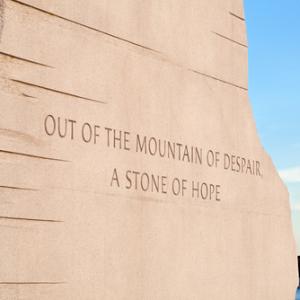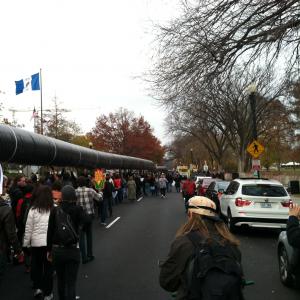
Rose Marie Berger is a Catholic peace activist and poet. She has been on Sojourners staff since 1986, and worked for social justice movements for 40 years. Rose has rooted herself with Sojourners magazine and ministry. She has written hundreds of articles for Sojourners and other publications and is a sought after preacher and public speaker. After living in Washington, D.C., for 35 years, she moved to Oak View, Calif., in 2022.
Rose’s work in Christian nonviolence has taken her to conflict zones around the world. She is active in the Catholic Nonviolence Initiative, a project of Pax Christi International, and served as co-editor for Advancing Nonviolence and Just Peace in the Church and the World, the fruit of a multiyear, global, participatory process to deepen Catholic understanding of and commitment to Gospel nonviolence. Her poetry has appeared in the books Watershed Discipleship: Reinhabiting a Bioregional Faith and Practice and Buffalo Shout, Salmon Cry: Conversations on Creation, Land Justice, and Life Together. She is author of Bending the Arch: Poems (2019), Drawn By God: A History of the Society of Catholic Medical Missionaries from 1967 to 1991 (with Janet Gottschalk, 2012), and Who Killed Donte Manning? The Story of an American Neighborhood. She has also been a religion reviewer for Publishers Weekly and a Huffington Post commentator. Her work has appeared in National Catholic Reporter, Publishers Weekly, Religion News Service, Radical Grace-Oneing, The Merton Seasonal, U.S. Catholic, and elsewhere. She serves on the board of The International Thomas Merton Society.
With Sojourners, Rose has worked as an organizer on peace and environmental issues, internship program director, liturgist, community pastor, poetry editor, and, currently, as a senior editor of Sojourners magazine, where she writes a regular column on spirituality and justice. She is responsible for the Living the Word biblical reflections on the Revised Common Lectionary, poetry, Bible studies, and interviews – and oversees the production of study guides and the online Bible study Preaching the Word.
Rose has a veteran history in social justice activism, including: leading the first international, inter-religious peace witness into Kyiv, Ukraine, following the outbreak of war in 2022, organizing inter-religious witness against the Keystone XL pipeline; educating and training groups in nonviolence; leading retreats in spirituality and justice; writing on topics as diverse as the “Spiritual Vision of Van Gogh, O'Keeffe, and Warhol,” the war in the Balkans, interviews with Black activists Vincent Harding and Yvonne Delk, the Love Canal's Lois Gibbs, and Mexican archbishop Ruiz, cultural commentary on the Catholic church and the peace movement, reviews of movies, books, and music.
Rose Berger has taught writing and poetry workshops for children and adults. She’s completed her MFA in poetry through the University of Southern Maine’s Stonecoast program. Her poetry has been published in Sojourners, The Other Side, Radix and D.C. Poets Against the War.
Rose grew up in the Central Valley of California, located in the rich flood plains of the Sacramento and American rivers. Raised in radical Catholic communities heavily influenced by Franciscans and the Catholic Worker movement, she served for nine years on the pastoral team for Sojourners Community Church; five as its co-pastor. She directed Sojourners internship program from 1990-1999. She is currently a senior editor and poetry editor for Sojourners magazine. She has traveled throughout the United States, and also in Ukraine, Israel/Palestine, Costa Rica, the Netherlands, Northern Ireland, Bosnia, Kosova, Peru, Colombia, Venezuela, and El Salvador visiting primarily with faith communities working for peace in situations of conflict.
Rose was born when atmospheric CO2 was at 319.08 ppm and now lives with her wife Heidi Thompson in Oak View, Calif., in the Ventura River watershed on traditional Chumash lands. Learn more at rosemarieberger.com.
Rose’s articles include:
- Pursuing the Secret of Joy: What is joy when it's not promiscuously tied to happiness, Hallmark, or hedonism?
- Why Our Faith Delegation went to Ukraine?: Our public message was simple: “We have come to Kyiv in solidarity to pray for a just peace.”
- Nonviolence in Najaf?: Will we recognize an Islamic peace movement when we see it?
- Of Love's Risen Body: The poetry of Denise Levertov, 1923-1997
- Glimpses of God Outside the Temple: The spiritual vision of Vincent Van Gogh, Georgia O'Keefe, and Andy Warhol.
- Damnation Will Not Be Televised: Almost everything I know about hell I learned from watching Buffy the Vampire Slayer
Speaking Topics
- Christian nonviolence, peace, war
- Catholic Nonviolence Initiative
- Climate change, creation care, watershed discipleship
- Bible study, liturgical year
- Poetry
- Spirituality and social justice
- Any topic covered in Sojourners magazine
- Catholicism
Speaking Format
- Preference for virtual events, but willing to discuss in-person events on case-by-case basis
Posts By This Author
'Why Are White People So Mean?'
THE METRO IS crowded today, and the 20-something, well-dressed white man has to stand, one hand holding the bar and the other his smartphone. It’s the end of the day. All the commuters—but one—are turned toward home. The young man’s face, like most of the others, is dulled with exhaustion. No one makes eye contact.
In a seat near the door, one woman sits facing everyone, looking backward. She studies the young man’s face intently, uncomfortably. He shifts. She rearranges the bags at her feet. Her reflection in the window shows an ashy neck above her oversized T-shirt collar. The train hums and clicks through a tunnel. As if in preparation, she takes another sip from the beat-up plastic cup she’s holding.
At last, she raises her voice and asks: “Why are white people so mean?” Boom! The electricity of America’s third rail crackles through the train. Faces fold in like origami or turn blank like a screensaver.
But this was no rhetorical question. When no one answers, she asks again, this time aiming her question at the young man with his phone. A flush creeps up his neck. “You look like you could be a sheriff,” she says to him. “Good and mean. I can see it in your eyes. You got mean eyes.” When he realizes her attention is stuck on him, he replies, “I hope I’m not mean. I try to be good.”
A Step Closer to Global Jubilee?
In the green hills of County Fermanagh, Northern Ireland, the world’s leading developed nations agreed on Tuesday to make individuals and companies pay the taxes that they owe. With the release this morning of the Lough Erne Declaration the G8 countries plan to implement greater tax collection internationally through fairer tax policies, greater financial transparency, and open trade.
The G8 plans to clamp down on tax-evaders and require shell companies — often used to take advantage of tax loopholes or to invest money anonymously —to identify their effective owners or primary beneficiaries. Developing countries, reported CNN, lose more in tax avoidance than they receive in aid. With the protocols agreed to today, indebted poor countries will be given access to the global information they need to collect the taxes they are owed.
Some anti-poverty campaigners describe the G8 deal as a historic achievement.
Illuminated
On my knees I beg forgiveness for my greed—
and for starving myself.
By your eyes I see you love this priest,
follow his lyrical fingers in praise of
a small white host he points here,
there.
The Pope We've Been Waiting For?
I WAS 15 when Pope Paul VI died in 1978. He’d been pope my whole life. Elated at the election of John Paul, I followed his papacy with all the obsessive focus of a teenager. When he died 33 days later, I simply didn’t know what to think. (His book Illustrissimi, a collection of letters written to saints, novelists, and artists, is one I return to for insight on Catholic imagination.)
During John Paul II’s 27 years as pope (the second longest reign in papal history), a dangerous nostalgia for a pre-Vatican II church was encouraged to flourish.
Under Pope Benedict XVI, that nostalgia came to fruition. The Latin Mass was re-established in many parishes. Amid a worldwide sex abuse scandal, liturgical correctness and “fancy dress” were too often elevated over children’s protection, victims’ needs, and institutional transparency. Women and girls were pushed further off the altar. To be gay, female, divorced, or a single mother—all these pushed one further from the table of the Lord, rather than drawing one nearer.
And now we have Pope Francis. When Jorge Mario Bergoglio announced he would take the name Francis, after Francis of Assisi, I wept. To have the Poverello (the “poor one”) at the center of our Catholic faith is right and just—whether that poor one is a 13th century itinerant preacher or a child in the villas miseria around Buenos Aires.
The Church Defends Amazon Environment, Threatened by Market Interests
The Ecclesial Network for the Amazon, a Catholic church network representing 12 Latin American countries, met recently in Puyo, Pastaza, Ecuador, challenging unrestrained market forces that are decimating the Amazonian ecosystem. The Network has been established to provide on-the-ground facts about Amazonia's environment, indigenous communities, and to strengthen the church in the region. Agenzia Fides reports:
"Many people still think that there is an unlimited amount of energy and resources that can be used, and that the negative effects of the wild manipulation of nature can be easily absorbed. But this is totally false." Such attitudes, Catholic Bishop Julio Parrilla continued, "are not rooted in science or technology, but in a technocratic ideology that serves the interests of the market." The Bishop concluded by reiterating "the influence of secularization, because when man turns away from God, he falls into the temptation of thinking that everything is permitted, in order to meet one’s immediate needs and desires."
For God So Loved the World
NEW YORK CITY has been bombed at least twice in the past decade. First by al Qaeda and second by Hurricane Sandy.
In the wake of the Sept. 11 attacks, the United States launched two ground wars and a worldwide "war on terror." Within two months, Congress federalized the Transportation Security Administration to secure airports. More than 263 government organizations were either created or reorganized. Some 1,931 private companies were put to work on counterterrorism, homeland security, and intelligence. Rightly or wrongly, America moved heaven and earth to stop terrorism in its tracks. It was seen as both an ongoing threat and a moral affront that had to be dealt with.
What about Climate Change?
In February, a New York State Senate task force on Superstorm Sandy compared the hurricane that affected 24 states to the 9/11 terrorist attacks. "[On 9/11] there were more than 3,000 souls lost, but in terms of the geographic destruction, it was isolated to Lower Manhattan," said Sen. Andrew Lanza (R-Staten Island). "[After Sandy] we have miles and miles and miles of destruction. Hundreds of thousands of homes affected, 60 ... New Yorkers killed, 250,000 to 260,000 businesses affected."
Hurricane Sandy killed 253 people in seven countries. It was the second largest Atlantic hurricane ever recorded—and the most expensive. It smashed into the East Coast with barely three days' warning. Like hurricanes Katrina and Rita before it, Sandy was a disaster of biblical proportions.
After 9/11, Americans knew in our gut that something was seriously wrong. Our moral intuition had been sucker punched.
Keystone XL Would Divide Jobs, Conquer Low-Income and Native American Communities
When it comes to the Keystone XL pipeline, the oil and gas industry want you to believe that you have to choose between jobs and prairie grass. This tactic is called the “divide and conquer” or “divide and rule” strategy. It’s as old as the empires of ancient Greece and Rome. It still works because human nature hasn’t changed that much.
Two years ago I sat down across the table from Dr. Kerri-Ann Jones, the highest ranking State Department official (short of the Secretary of State) to weigh in on the Keystone XL pipeline permit process. A group of religious leaders were delivering thousands of petitions to Dr. Jones asking her to to stop the pipeline.
I said to her, "If this decision about the pipeline was made purely based on the climate science, we wouldn't be here having this discussion." She’s a scientist. She knows the score. She didn't disagree. “But,” she said, “everywhere we go across the country we hear about the need for jobs – especially in the middle of the country.”
Divide and conquer.
At the River We Stand
FROM THE RIVER to the rope. From the creek to the cross. From the dove and a "voice from above" to death by state execution and profound silence.
This is Lent. This is the Jesus Road, the Christian way. O Lord, how can we follow you?
Lent is time of remembering ourselves. In the ancient church, those preparing for baptism were publicly challenged: Do you renounce your bondage to Master Satan? Do you reject the slave-mind and all its glamour and subtle temptations? Will you allow Christ to buy your freedom?
The catechumen turned to face the east and the dawn, answering: "I give myself up to thee, O Christ, to be ruled by thy precepts."
It is Lent. We go down to the river to pray. We step into the waters of repentance. We surface as a new creature in Christ. From that moment onward, we imprint on Jesus. This is our survival strategy as newborn disciples. We follow him, like ducklings behind their mother.
After his baptism in the Jordan River, Jesus is driven straight out—into the unloved places, into the wilderness. There he is pricked by demons to toughen him up. He is being prepared. He must look into his own despair. Satan is the supreme surgeon for separating us from our hope.
Are Women the Secret Weapon in Battle for Food Security?
On Monday, Olivier De Schutter, U.N. special rapporteur on the right to food, submitted his report Gender and Food Security to the U.N. Human Rights Council, adding to the mountains of evidence that if you empower women with education and independent rights, they can substantially, cost-effectively, and generationally reduce hunger and malnutrition. The Guardian's Poverty Matters Blog reported:
The notion that gender equality can play an important role in reducing hunger and malnutrition has gained increasing traction in development circles. The UN's Food and Agriculture Organisation claimed in its 2010-11 State of Food and Agriculture report that equal access to agricultural resources could reduce world hunger by 12-17%. Gender and food security also came under the spotlight in the 2012 edition of the World Bank's flagship annual report, where it was argued that parity in areas including landrights, employment and political representation could improve development outcomes.
These ideas are not new. Obliged to raise children, care for sick and elderly people, and run households – work that, valued in monetary terms, would be equivalent to 15% of GDP in low-income countries, rising to 35% in middle-income countries – it has long been argued that women are being denied education opportunities, marginalising them both economically and politically. The challenge lies in convincing policymakers to do something about these multiple challenges.
Says De Schutter:
"We must address how gender roles are being defined within the family and who makes the decisions in government. ...We must refuse to take existing gender roles as givens, and instead allow women to shift the burden to men;where possible, giving women access to more opportunities and better training and education, and exposure to something other than the traditional responsibilities they have been assuming."
"If local NGOs and women's organisations and unions mobilise, using the report to put pressure on the government from below, that will be even more effective than international pressure."
State Department's Latest Wrong-Headed Analysis of Keystone XL Pipeline
Last week, the State Department issued its next draft of the supplemental environmental impact statement (SEIS) assessing the northern route of TransCanada’s Keystone XL pipeline. Officially, the State Department does not make any recommendations on whether the pipeline should be approved or denied. But the summation language is all to the positive — making it clear that the State Department still doesn’t understand global warming and its disastrous consequences.
I’m sure the scientists, policy analysts, and environmentalists among us will soon sort out and explain the hundreds of pages released by the State Department March 1. But until then, here’s the part I found most significant: “The life-cycle carbon footprint, for transportation fuels produced in U.S. refineries, would increase if the project were approved.”
Please note that this information is buried way way way deep in the documents. The general summary by the State Department is favorable toward industry and the pipeline, though there are some conclusions drawn that I think are not supportable.
Private Prison Companies Pressure Against Comprehensive Immigration Reform
Investigative reporter Lee Fang looks at how private prison corporations are making money off of criminalizing immigration status infractions and how they are protecting their profit margins by lobbying against pathways to citizenship and for increased "border security" when none is needed.
On the one hand, a pathway to citizenship and legal reforms sought by advocates could reduce the number of immigrants detained by CCA and its competitors in the private prison industry. “Private prison corporations have an enormous stake in immigration reform,” says Bob Libal, a prison reform advocate with Grassroots Leadership. “A reform that provides a timely pathway to citizenship without further criminalizing migration would be a huge hit to the industry,” he says.
On the other hand, Libal observed that a bill with increased security measures “could be very profitable” for the industry. Legislators and the Obama administration could adopt a plan that mirrors Republican proposals for an “enforcement first” approach, which include increased police powers, new mandatory detention and sentencing laws, further militarization of the border and proposals for more prisons and detention officers.
See more at How Private Prisons Game The Immigration System
House Passes Bill Requiring FEMA to Deliver Storm Aid to Houses of Worship
Following more than 200 houses of worship being denied FEMA aid following Superstorm Sandy, on Feb. 13, the House of Representatives passed H.R. 592 with a vote of 354-72, to clarify that houses of worship are “eligible for certain disaster relief and emergency assistance on terms equal to other eligible private nonprofit facilities, and for other purposes.” From The Hill:
Supporters of the bipartisan bill, H.R. 592, said federal aid to houses of worship is not a violation of the Constitution when that aid is meant to be used broadly for a range of affected entities. In those cases, federal aid need not be withheld from houses of worship that are, like many others, seeking to repair their buildings from storm damage.
"There is no intrinsically religious purpose in providing disaster assistance," said Rep. Nick Rahall (D-W.Va.), a supporter of the bill.
Read more HERE.
Episcopal Bishop Schori Addresses Senate Committee on Gun Violence
"I urge lawmakers to press for comprehensive and universal background checks for firearm ownership, regardless of where and how a gun is purchased; for bans on the availability to civilians of assault rifles and high-capacity magazines; and for policies designed to better regulate the manufacture of guns,” the Presiding Bishop states in her testimony. “The Episcopal Church also supports the highest level of accountability for violation of all existing laws pertaining to violence in our midst.”
What Happens When the 'See of Peter' is Vacant?
After nearly eight years since being named to the chair of Peter, Pope Benedict XVI announced this morning that he is resigning at the end of February.
" ... in today’s world, subject to so many rapid changes and shaken by questions of deep relevance for the life of faith, in order to govern the bark of Saint Peter and proclaim the Gospel, both strength of mind and body are necessary, strength which in the last few months, has deteriorated in me to the extent that I have had to recognize my incapacity to adequately fulfill the ministry entrusted to me. For this reason, and well aware of the seriousness of this act, with full freedom I declare that I renounce the ministry of Bishop of Rome, Successor of Saint Peter, entrusted to me by the Cardinals on 19 April 2005, in such a way, that as from 28 February 2013, at 20:00 hours, the See of Rome, the See of Saint Peter, will be vacant and a Conclave to elect the new Supreme Pontiff will have to be convoked by those whose competence it is."
Video: ‘Developing Tar Sands Means Losing Control of the Climate’
“If we fully develop the tar sands, we will certainly lose control of the climate. We will get to a point where we can not walk back from the cliff,” says climate scientist Dr. John Abraham. The Keystone XL pipeline is the lynchpin to developing the tar sands in Alberta.
I’ve been paying attention to the Keystone pipeline development since 2011 when it was under review by the State Department. I joined a group of religious leaders to deliver thousands of petitions to Dr. Kerri-Ann Jones, Assistant Secretary of State for Oceans and International Environmental and Scientific Affairs, asking her to to stop the pipeline. I said to her, “If this decision about the pipeline was made purely based on the climate science, we wouldn’t be here having this discussion.” She didn’t disagree. The exploitation of tar sands will significantly worsen the climate.
Now, new scientific data shows that developing the tar sands (and the pipeline to carry it) is worse than previously known. The video above shows climate scientists countering the notion that the climate impacts of the Keystone XL pipeline are small compared to total U.S. global greenhouse gas emissions. Nathan Lemphers, a Senior Policy Analyst with the Pembina Institute, details how the Keystone XL is a critical ingredient to significant expansion of tar sands. He dispels the myth being promoted by the tar sands oil industry that tar sands development is inevitable with our without Keystone XL. That’s not true. All other routes are similarly being blocked.
Bible Wars: Do We Know What King Actually Did?
Blogger Hamden Rice's 2011 essay "Most of You Have No Idea What Martin Luther King Actually Did" has become an underground classic that rightly resurfaces around King Day events.
Why We (Still) Can't Wait
DURING THE unseasonably warm autumn of 1951, 22-year-old Martin King Jr. began his doctoral work in systematic theology at Boston University. Wearing his good suit in a stifling classroom, he was first introduced to the work of philosopher and ethicist Josiah Royce. King read Royce's well-regarded 1913 book The Problem of Christianity and wrestled with Royce's metaphysical values of loyalty, communitarian ideals, and the role of the individual within a group.
But don't let the high academic or philosophical language fool you. Royce was interested in only one thing: Love. It was the hidden heart of all his endeavors. And King began to study—and embrace—Royce's most important philosophical concept: the Beloved Community.
Though Royce had first written about the Beloved Community nearly 40 years earlier, King heard it in the context of his own time and place. He heard it in the context of the insidious Jim Crow laws of the South. In 1951 he also heard it in the context of the bitter race realities of the North. The July before King started classes at Harvard, a race riot had erupted in Cicero, Illinois, outside Chicago. A mob of whites attacked an apartment building that housed one black family, that of Harvey Clark Jr., a WW II veteran and bus driver who had moved into the all-white neighborhood.
What Are You Singing: I Saw Three Ships Come Sailing In
One carol I’ve been humming this Advent is “I Saw Three Ships Come Sailing In.” It’s not one I grew up singing, but I love it. The most popular contemporary lyrics talk about “three ships come sailing in” to Bethlehem on Christmas morning. Bruce Cockburn says the weird lyrics are the result of English folk in the 18th century hallucinating from eating too much ergot in their moldy English bread. Certainly there were no ships sailing into landlocked Bethlehem.
Burn Your NRA Card
President Obama addressed the nation on Wednesday morning to establish a commission led by Vice President Biden on stronger gun safety laws. Gone was the passion of his address at the interfaith service in Newtown and in place we have back the above-the-fray politician.
However, one point was clear. “If we are going to change things,” he said, “it is going to take a wave of Americans … standing up and saying ‘enough’ on behalf of our kids.”
Will Obama’s address beat the National Rife Association’s messaging strategy?
On Friday, Dec. 21, the NRA will hold its first a press conference after the Newtown, Conn., massacre—and America’s first reasonable conversation on stronger gun laws will come to an end.
The Thing From the Oil Company Board Room
The Global North and West is addicted to fossilized fuel. Myself included. And we are trying to push our addictions onto the Global South.
Everywhere we look the fossil fuel pushers are in our face, luring us into our next fix.
Not a week after the elections, the American Petroleum Institute launched ads in Alaska, Louisiana, New Mexico, Colorado, Virginia, Arkansas, and North Carolina targeting U.S. senators who are raising the issue of climate change; specifically, the ones calling into question oil company subsidies.
The oil and gas companies try seduction ("fighting for jobs"). They try fear ("we are too big to fail"). They accuse us of being unfair to them ("Discriminatory treatment of the oil and gas industry is a bad idea"). They try bullying and slandering.
Even when our court system recently convicted one of them killing (BP convicted of "manslaughter" for the 11 murdered on Gulf Oil spill rigs), they are not stopped.











